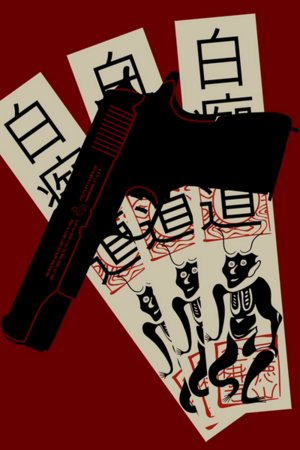Chapter 2:
Loner and Lonely
Blue and Endless Rains
Lunchtime is probably the best part of my day. Other people prefer eating in groups, chatting and laughing like it’s some social event. I don’t get it. Lunch is supposed to be a time to replenish energy, not waste it.
Eating in the classroom? No way—too loud, too crowded.
Eating in the bathroom? Gross. I’m a loner, not desperate. The bathroom stall reeked of lemon disinfectant and poor life choices. Last week’s graffiti glared at me in marker-red: LONERS DIE ALONE. I’d take that over suffocating on someone’s konbini egg sandwich breath.
Eating on the rooftop? Perfect.
Up here, it’s quiet. The wind carries a soft chill. Puddles from yesterday’s rain scatter across the rooftop. The sun’s reflection flickers on the water, adding a dim glow to the gray sky. It’s a lonely place, but somehow, that makes it comfortable.
My chopsticks hovered over the bento—the pickled plum’s crimson eye staring up from rice-white nothingness. Even my food understood the assignment: Exist quietly. Don’t disturb.
The egg roll was missing.
Not that I remembered eating it. Grease-stain left the compartment—the only evidence it ever existed.
“Your bento looks especially delicious.”
Ao’s shadow fell across my lunch. “Missing something?” She asked, holding her laughter. Her grin widened as she produced the egg roll, golden-brown crust glistening with one perfect bite mark. “Energy replenishment works better when you actually eat your food, Mister Blue.”
She didn’t just read my mind… did she?
Anyway.
“Why are you stealing my food?” I asked. “Wait, no—why are you even here?”
She sat beside me, cracking open a bento box. Peeling Totoro stickers. Faded thermos. A lunchbox as transient as rooftop rain. “Rooftop ghosts get hungry too.”
Her knee bumped mine. Once. Twice. On the third nudge, I stopped pulling away. “You always eat your lunch alone, don’t you?”
I gripped my chopsticks tighter. “Of course, I do,” I said. “Can you even picture me eating with other people?”
“So?”
“So it’s impossible.”
Her chopsticks froze mid-air. “Impossible’s just a word for people scared of chopstick-sharing.”
“We’re eating together,” she said. “And you say it’s impossible?”
I stared at the bite mark on the egg roll. A perfect crescent. A stolen eclipse.
“This isn’t eating together,” I muttered. “This is… coexistence through theft.”
Her laughter ricocheted off the waterlogged concrete. “Coexistence requires consent. You’ve been letting me steal since I sat here.”
“You should be used to being with other people, Ichijo.”
“I can’t. I’ve spent my whole life learning how to avoid people, not how to be with them.”
We lapsed into silence older than our acquaintance. Her knee stayed pressed against mine, warm as the egg roll she’d half-inched. Familiarity bloomed like mold on forgotten bread—unwanted, inevitable, proof something once lived here.
And just like that, the school bell rang—lunch was over. Before I knew it… it just happened. Ao sighed, stretching her arms.
“Guess lunch is over,” she said, standing up. “See you around, Ichijo.”
She left first, leaving only the echo of her footsteps and the distant hum of the school below.
Did I just eat lunch with someone?
The wind picked up, ruffling my hair. The rooftop felt a little emptier now.
With a sigh, I packed my bento box and headed down the stairs. The stairwell smelled of ammonia and regret—third-floor janitor’s territory.
The cool air disappeared as I stepped into the fluorescent-lit hallway, the muffled sounds of desks shifting and voices murmuring pulling me back into routine.
By the time I reached the classroom, the noise of the world had returned—scraping chairs, murmuring voices, the teacher’s monotone. I just wished I could go home already.
…
“So this one goes there, and that one goes there…”
The teacher kept yapping about mathematics. I wasn’t paying attention. The only thing I could focus on was the sound of chalk scraping against the blackboard, each stroke a dry whisper against silence. My pencil hovered over my notebook, unmoving. Outside the window, the sky stretched gray and endless, like an unfinished thought.
I looked to my side and I saw Ao. She was sleeping—with a textbook in front of her. She really was sitting beside me.
The rest of the day passed in a blur of half-heard lectures and the soft scratch of pencil against paper. I wasn’t paying attention—not really. When the final bell rang, I grabbed my bag and walked out of the classroom. No goodbyes. Not even a glance at anyone.
The hallway buzzed with chatter, voices colliding like waves. Loud. Too loud. But no one called out to me, and I didn’t call out to anyone. I wasn’t in any club, so I left earlier than most, slipping past clusters of students making after-school plans.
Outside, the athletes were already at practice—sprinting, kicking, laughing. Their world was fast, moving forward. I could never. Their laughter faded as I go away.
The school gate loomed ahead, crowded with students waiting for friends. Their voices blended into a distant hum as I passed through. Only when I turned onto the quieter streets did the noise fade.
And then, the sound of a swing.
Creak.
I looked. The same playground from yesterday.
A figure sat on the swing, long blue hair draping over their shoulders. A familiar blue hairclip. A Sanrio keychain dangling from their bag. A soda can gripped loosely in one hand.
Ao.
She looked troubled.
My hand stopped mid-air as I was trying to say hello.“This isn’t like me,” I muttered. I should just walk away. That’s how I’ve always been. That’s what I’d normally do. But the words come out before I could stop—
“Drinking soda alone?”
…
“Ichijo?”
One glance at me, and she smiled. That smile. It looks real enough—but I know better now.
“I’m not like you,” she said.
She was sitting down on the same seat that I did yesterday.
Rust flakes stuck to my palms. The swing creaked as I sat down. Familiarity bloomed again—unwanted, inevitable.In front of her, there were soda cans. One of them was different.
She gulped down the can of soda until it was empty. She looked at the odd one out of the cans. Her nails tracing the rim of the aluminum.
“Have you ever tried to fit in?” She asked.
She lined up the soda cans—four of them, perfectly placed. Then, without a word, she nudged the odd one out, sending it rolling onto the dirt.
“Even when you know you’re different,” she murmured, “trying to fit in is tough.”
I stared at the fallen can, its silver shell reflecting the dim light. It didn’t belong anymore. Just like that.
Was she just making conversation? Or was she talking about herself?
I looked at her. Her expression was different from a while ago. Gloom. Written all over her face was… something different, unlike her usual “self”. She seemed tired—not just physically, but of something deeper. Tired of running, pretending.
She stood up from the rusty swing, leaving it creaking loudly.
“I should go home,” she said. “You should go home as well, Ichijo.”
Her figure disappeared under the dim, gray sky. Her reflection from the water puddle—blurry. Evidence of yesterday’s rain.
I wasn’t sure if she was waiting for someone to notice or hoping no one would.
What was she trying to say?




Please sign in to leave a comment.